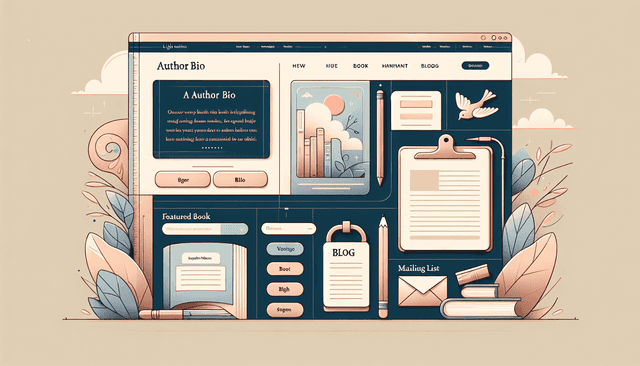Table of Contents
Marketing a self-published book can feel like trying to find a needle in a haystack. With so many authors vying for attention, it’s easy to feel overwhelmed and unsure about where to start. Trust me, you’re not alone in wondering how to make your book stand out!
But don’t fret! If you stick with me, you’ll discover simple yet effective strategies that can elevate your book marketing game. By the end, you’ll feel equipped to tackle those daunting promotional tasks with confidence and maybe even a little excitement.
From building a solid author platform to leveraging social media, we’ll explore essential steps that can lead your self-published book to the readers it deserves. It’s time to roll up your sleeves and dive into the world of book marketing!
Key Takeaways
- Identify your target audience to tailor your marketing efforts effectively.
- Create a professional author website as your main marketing hub.
- Utilize social media to engage with readers and share updates about your journey.
- Encourage word-of-mouth by asking friends and early readers for reviews.
- Network with other authors and influencers for potential cross-promotion.
- Participate in book festivals and events to connect with readers directly.
- Use email marketing to communicate updates and engage your audience regularly.
- Offer promotions and discounts to create urgency and boost sales.
- Consider paid advertising to reach a broader audience for your book.
- Focus on content marketing by sharing valuable insights and stories related to your book.

Simple Steps to Market Your Self-Published Book
Marketing your self-published book doesn’t have to be a daunting task. Start by identifying your target audience, so you can tailor your marketing efforts to reach the right readers. Create a detailed plan with specific goals and timelines to keep yourself organized.
Leverage both online and offline channels to promote your book. This can include setting up a dedicated social media page, joining relevant author groups, and participating in local community events. Each little effort adds up.
Don’t underestimate the power of word-of-mouth. Encourage friends, family, and early readers to share their thoughts on social media or forums. Consider using platforms like Goodreads or your own blog as a launching pad for discussions about your book.
Build an Author Platform
Your author platform is basically your online presence and plays a key role in promoting your work. Start by creating a professional website where readers can find information about you and your books. Sites like Wix or WordPress make it easy to set up a gorgeous site, even if you’re not tech-savvy.
Share your writing journey, insights into your creative process, and updates on your latest projects. This personal touch can resonate with readers and encourage them to interact with you.
Utilize an email newsletter to keep your audience engaged. Share exclusive content, upcoming releases, and personal notes. It’s a great way to foster a community around your work.
Utilize Social Media for Promotion
Social media is a powerful tool for promoting your book. Find the platforms where your audience hangs out—be it Instagram, Twitter, or Facebook—and focus your efforts there. Each platform has its quirks, so don’t be afraid to tailor your approach to fit.
Regularly post engaging content such as behind-the-scenes peeks, character sketches, polls, or even live readings. The goal is to make your followers feel part of your journey.
Don’t forget to engage with your followers. Respond to comments, ask questions, and create content that invites interaction. This way, you create a loyal fanbase that feels personally connected to your work.

Create an Engaging Book Website
Your book website should be your online hub. It’s where potential readers will go to learn more about you and your work.
Make sure it reflects your style and personality. Use colors, fonts, and images that match your book’s theme.
Include a blog section to share updates, writing tips, or behind-the-scenes stories. This keeps readers coming back for fresh content.
Don’t forget to add sections for your book(s), an author bio, and links to purchase directly. A good call-to-action can drive sales!
Consider adding a mailing list sign-up form. Offering a free short story or a sample chapter can entice visitors to subscribe.
Leverage Book Reviews and Ratings
Book reviews can significantly influence a reader’s decision to buy your book. Start by reaching out to your friends and beta readers to get initial reviews.
Use platforms like Goodreads to connect with reviewers who specialize in your genre.
Encourage your readers to leave honest feedback on Amazon and other retail sites. More reviews can enhance your book’s visibility.
Consider sending out ARC (Advance Reader Copies) to generate buzz before launch. Just be clear that the reviews should be honest and unsolicited.
Don’t forget to thank reviewers publicly. Building a positive relationship with reviewers can lead to ongoing support.
Network with Other Authors and Influencers
Networking is crucial in the book world. Connect with fellow authors via social media or local writing groups.
Collaboration can lead to cross-promotion. Consider guest blogging, podcast appearances, or co-hosting events.
Join author platforms or groups where you can share experiences and strategies. Facebook groups can be particularly helpful.
Don’t shy away from approaching influencers in your genre. Sending them a copy of your book can lead to a review or mention on their platforms.
Attend writing workshops and conferences to meet people face-to-face. Building real connections can lead to surprising opportunities.
Attend Book Festivals and Events
Book festivals and literary events can be a goldmine for self-published authors. Check local listings for festivals or fairs where you can showcase your work.
What’s even better? Many events offer workshops and panels that can help you learn more about the industry.
Set up a booth or table to sell your book directly and network with readers and fellow authors.
Don’t forget promotional material like bookmarks or business cards with your website and social media links.
Even if you can’t attend as an author, simply mingling can provide insights and contacts that will help you down the road.
Use Email Marketing to Connect with Readers
Email marketing might seem old-fashioned, but it’s incredibly effective. Collect emails through your website sign-up form or at events you’ve attended.
Send regular newsletters with updates about upcoming books, events, or exclusive content. Make it relatable and ensure it reflects your voice.
Offer valuable content in your emails. This could be a free writing prompt, a sneak peek at your next book, or special discounts.
Segment your email list based on reader interests to personalize the content they receive. This makes them feel valued.
Consider using email marketing tools like Mailchimp or ConvertKit to manage your list and schedule campaigns effectively.
Offer Promotions and Discounts
Promotions can create urgency and increase sales. Consider offering limited-time discounts when you launch your book or during special occasions.
Use social media to announce any promotions. Create eye-catching graphics to grab attention.
Consider bundling your book with others you’ve written or with related products, like companion guides or workbooks.
Offering a free sample or the first chapter of your book can encourage readers to make a purchase.
Always follow up with readers after a discount period to encourage future purchases and gather feedback.
Consider Paid Advertising Options
Sometimes, a little cash can go a long way. Platforms like Facebook and Goodreads offer targeted ads that can specifically reach your desired audience.
Consider running a campaign on Amazon to boost your visibility, especially during the launch phase.
Research your audience’s demographics to tailor your ads effectively. This can increase both engagement and conversions.
Be mindful of your budget and set limits to avoid overspending. Test different types of ads to see what resonates best.
Don’t forget to track your ad performance to measure the return on your investment.
Focus on Content Marketing Strategies
Content marketing involves creating valuable content that attracts and engages your audience. Start a blog related to your book’s themes.
Write articles, how-tos, or even personal anecdotes that resonate with your readers. Share this content on social media for wider reach.
Create videos or podcasts discussing topics relevant to your book. This builds a deeper connection with your audience.
Use interactive content like quizzes or challenges related to your book’s topic to engage your audience further.
Regularly share insights or tips that can help readers. This positions you as an authority in your niche and builds credibility.
FAQs
Building a strong author platform involves creating a presence across multiple channels, such as a dedicated website and active social media accounts. Share valuable content, engage with readers, and showcase your expertise in your genre to attract a loyal audience.
Utilize social media by sharing engaging content related to your book, such as behind-the-scenes insights or character profiles. Connect with readers through polls and Q&A sessions, and collaborate with influencers to expand your reach.
To get reviews, reach out to book bloggers, reviewers, and early readers in your network. Offer free copies in exchange for honest reviews, and encourage readers on social media to share their thoughts after reading.
Enhance your email marketing by offering exclusive content, such as sneak peeks or bonus chapters, to subscribers. Regularly update them with news about your writing journey, and create engaging newsletters to maintain reader interest.



